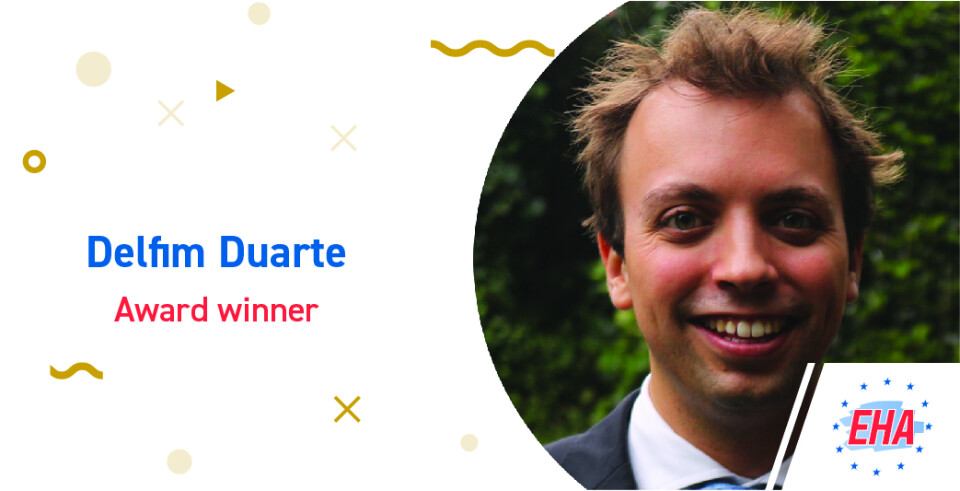Meet our first Physician Scientist Research Grant winner

In 2018 the Physician Scientist Research Grant was awarded for the first time. This grant is aimed at physician scientists who are MD or equivalent and are within 4 years after PhD graduation or graduation of hematology training (or equivalent). They must have a proven track record in research by publications and must have at least 50% protected time for performing the research project, to be justified in the letter of support by the institute where the research will be performed. It is highly preferred that the topic of research is related to the specialty in the clinic. (e.g. LAB: developing a mouse model in MPN, CLINIC: treating MPN)
- Please tell us more about yourself (name, lab, short bio)
My name is Delfim Duarte, I’m from Porto in Portugal where I graduated in Medicine at the University of Porto. I started doing research on angiogenesis and inflammation as an undergraduate, which fueled my interest to pursue a physician-scientist career. I then started the residency program in Hematology at the Portuguese Institute of Oncology in Porto (IPO-Porto), which I interrupted to do full-time research as a GABBA PhD student. I moved to Cristina Lo Celso’s lab at Imperial College London where I worked on intravital imaging of acute leukemia cells and their interactions with bone marrow microenvironments. I recently returned to Porto, where I am completing my clinical training at IPO-Porto and doing research at i3S (University of Porto).
- What will winning the PSRG mean for your career?
The EHA Physician-Scientist Research Grant will allow me to explore my own research questions and to achieve independence, bringing new people to work with me. Balancing the clinical duties with lab work/management is challenging and I believe the PSRG really enables it. It is a career landmark for me and I’m grateful to EHA for the support.
- How did you experience the application for this grant?
I started writing the proposal in advance, which gave me time to show it to other colleagues and get feedback. I particularly enjoyed the discussion with peers and the establishment of collaborations for the project. I learned a lot in these discussions and reading the existing literature, which was particularly rewarding and fun. The preparation of the application also allowed me to know better my institute, the people and the core facilities, which will be helpful for the project development.
- Do you have any tips for those who would like to apply for such a grant as well?
In my opinion, the 3 key factors are: question, approach and mentorship. A very good research question that has the potential to generate novel findings is central. The science and proposed approach need to be sound and having a good CV will definitely help. Having good mentors will also be fundamental to build a successful proposal. In my case, I had great mentors in the past, Cristina Lo Celso and Edwin Hawkins and I presently have mentorship and support from Graça Porto at i3S. Look for a mentor who will take time to discuss not only science but who also cares about you. I would also recommend applying for the EHA-ASH Translational Research Training in Hematology (TRTH). It is a fantastic program to meet talented colleagues, receive mentorship and get training in grant writing.
- What research project will you pursue for the PSRG?
My project aims to explore the role of iron in the remodeling of the vascular microenvironment in acute myeloid leukemia (AML).
- Can you tell us more about it?
I previously observed that AML cells selectively destroy bone-lining endosteal blood vessels, which has implications for loss of non-malignant blood cells (cytopenias) and for chemoresistance. We have preliminary data suggesting iron might play a role in the remodeling of the vascular microenvironment. Using patient samples and mouse models we will explore this hypothesis.
- What would you like to achieve with your research?
The primary goal is to uncover disease mechanisms in AML. These can have therapeutic implications, not only for curative therapies but also for supportive treatments that increase the quality of life of unfit AML patients.
- What will the world be like without your research?
In most cases, single research projects have only a small impact in medical advancement. If our research has a small impact and, specially if it generates new questions, I will be very happy.



 Back
Back